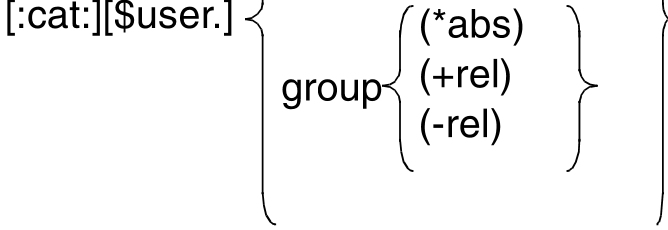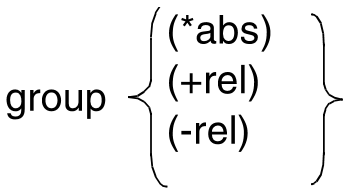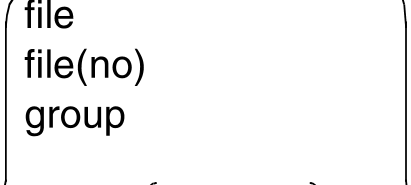Data types | Character set | Special rules |
alphanum-name | A...Z
0...9
$, #, @ | |
cat-id | A...Z
0...9 | Not more than 4 characters;
must not begin with the string PUB |
command-rest | Freely selectable | |
composed-name | A...Z
0...9
$, #, @
hyphen
period
catalog ID | Alphanumeric string that can be split into multiple
substrings by means of a period or hyphen.
If a file name can also be specified, the string may
begin with a catalog ID in the form :cat: (see data
type filename below). |
c-string | EBCDIC character | Must be enclosed within single quotes;
the letter C may be prefixed; any single quotes
occurring within the string must be entered twice. |
date | 0...9
Structure identifier:
hyphen | Input format: jjjj-mm-tt jjjj: | year; optionally 2- or 4 digits | mm: | month | tt: | day |
|
device | A...Z
0...9
hyphen | Character string, max. 8 characters in length,
corresponding to a device available in the system.
In guided dialog, SDF displays the valid operand
values. For notes on possible devices, see the
relevant operand description. |
fixed | +, -
0...9
period | Input format: [character][ziffern].[ziffern] [sign]: | + oder - | [digits]: | 0...9 |
must contain at least one digit, and may
contain up to 10 characters (0...9, period) apart
from the sign. |
filename | A...Z
0...9
$, #, @
hyphen
period | Input format:  :cat: optional entry of the catalog identifier;
character set limited to A...Z and 0...9;
maximum of 4 characters; must be enclosed
in colons; the default value is the catalog
identifier assigned to the user ID, as specified
in the user catalog. $user. optional entry of the user ID;
character set is A...Z, 0...9, $, #, @;
maximum of 8 characters; first character
must not be a digit; $ and period are mandatory;
the default value is the user' s own ID. $. (special case) system default ID file file or job variable name;
may be split into a number of partial names
using a period as a delimiter:
name1[.name2[...]]
name does not contain a period and must not i begin or end with a hyphen;
file can have a max. length of 41 characters;
it must not begin with a $ and must include at
least one character from the range A...Z. #file
@file | (special case)
(special case) |
# or @ used as the first character indicates
temporary files or job variables, depending on
system generation. |
filename
(continued) | | file(no) Tape file name
no: version number;
character set is A...Z, 0...9, $, #, @.
Parentheses must be specified. group Name of a file generation group
(character set: as for "file")  (*abs) absolute generation number (1..9999);
* and parentheses must be specified. (+rel)
(-rel) relative generation number (0..99);
sign and parentheses must be specified. |
integer | 0...9, +, - | + or -, if specified, must be the first character
(sign). |
name | A...Z
0...9
$, #, @ | Must not begin with a digit |
partial-filename | A...Z
0...9
$, #, @
hyphen
period | Input format: [:cat:][$user.][partname.] :cat: see filename
$user. see filename partname optional entry of the initial part of a name
common to a number of files or file generation
groups in the form:
name1.[name2.[...]]
name (see filename). i The final character of “partname” must be a
period.
At least one of the parts :cat:, $user. or
partname must be specified. |
posix-filename | A...Z
0...9
special characters | String with a length of up to 255 characters;
consists of either one or two periods or of alphanumeric
characters and special characters. The
special characters must be escaped with a
preceding \ (backslash); the slash (/) is not allowed.
Must be enclosed within single quotes if alternative
data types are permitted, if separators are
used, or if the first character is a ?, ! or ^.
A distinction is made between uppercase and
lowercase. |
posix-pathname | A...Z
0...9
special charactersn
structure identifier:
slash | Input format: [/]part1/.../partn
where partn is a posix-filename;
max. 1024 characters;
must be enclosed within single quotes if alternative
data types are permitted, if separators are
used, or if the first character is ?, ! or ^. |
product-version | A...Z
0...9
period
single quote | Input format: [[C]'][V][m]m.naso[']  correction status
release status where m, n, s and o are all digits and a is a letter.
Whether specification of the release and/or
correction status is optional or mandatory is determined
by suffixes to the data type (see the
corresponding table: suffixes without-corr, withoutman,
mandatory-man and mandatory-corr).
product-version may be enclosed in single quotes
(possibly with a preceding C). The version
specification may begin with the letter V. |
structured-name | A...Z
0...9
$, #, @
hyphen | Alphanumeric string which may comprise a number
of substrings separated by a hyphen. First
character: A...Z or $, #, @ |
text | Freely selectable | For the input format, see the relevant operand
descriptions. |
time | 0...9
structure identifier:
colon | Time-of-day entry Input format: |  |
|  | hh: | hours | mm: | minutes | ss: | seconds |
Leading zeros may be omitted |
vsn | A...Z
0...9
A...Z 0...9
$, #, @ | Input format: pvsid.sequence-no
max. 6 characters; pvsid: | 2-4 characters; PUB is not
permitted |
sequence-no: 1 1-3 characters
max. 6 characters; PUB may be prefixed, but must not be
followed by $,#,@. |
x-string | Hexadecimal:
00...FF | Must be enclosed in single quotes; must be
prefixed by the letter X. There may be an odd number
of characters. |
x-text | Hexadecimal:
00...FF | Must not be enclosed in single quotes;
the letter X must not be prefixed. There may be an
odd number of characters. |







